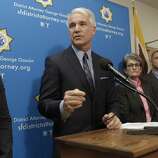S.F., L.A. sue Uber 'to protect consumers’; Lyft settles charges
Tuesday, December 9, 2014
San Francisco and Los Angeles district attorneys filed a consumer protection lawsuit against on-demand ride service Uber on Tuesday, saying it misleads customers about driver background checks and violates state laws about airport rides and calculating fares.
Rival service Lyft settled similar allegations and agreed to pay up to $500,000 in civil fines.
Gascón and his Los Angeles counterpart Jackie Lacey filed a case in San Francisco Superior Court seeking a permanent injunction to stop Uber’s alleged violations, as well as civil penalties and restitution for consumers.
Uber spokeswoman Eva Behrend had a different take.
Available in 250 cities worldwide, privately held Uber last week raised $1.2 billion in funding, giving it a valuation of $40 billion — more than CBS, American Airlines or Kraft Foods. But the San Francisco company continues to anger regulators. In the past week, Uber was banned in India, Spain and Thailand and threatened with a ban in Portland, Ore. Uber claims that entrenched taxi interests prompt the backlash.
Gascón laid out several allegations against Uber.
Uber falsely claims that its driver background checks are superior to those for taxi drivers, he said, but refuses to use fingerprint checks, which provide the most rigorous screening and the only way to ascertain drivers’ true identities. Taxi drivers are vetted with fingerprint checks. Moreover, Uber charges passengers a $1 “safe rides fee” and falsely claims that money goes toward “industry-leading” background checks, he said.
Other complaints against Uber revolve around airport rides. Although it recently received permission to operate at San Francisco International Airport, it “unlawfully” encourages its drivers to work at other airports without permission, said the complaint. At SFO, it charged a $4 “airport fee toll” to customers even before receiving permission to operate there — and didn’t remit that money to the airport, the case said.
Lyft agreed to an injunction requiring it to submit its app for evaluation of its accuracy, to obtain permits to operate at California airports (it has permission to serve SFO) and not to make misleading statements about its background checks, Gascon said. The company will pay a $250,000 civil penalty within 30 days; a second $250,000 will be waived after a year if it complies with all terms of the injunction.
“After months of productive conversations, Lyft has entered into an agreement with district attorneys of San Francisco and Los Angeles that demonstrates our shared commitment to consumers and innovation,” Lyft spokeswoman Erin Simpson said in a statement.
Gascón said negotiations are under way with Sidecar, which also offers on-demand rides.
The district attorneys previously said that the carpool options recently added by Uber, Lyft and Sidecar violated state laws. Gascón said the California Public Utilities Commission, which regulates the ride-service companies, is taking the lead on handling that issue.
Over the summer, California lawmakers considered legislation to require fingerprint background checks for Uber and Lyft drivers, as well as drug and alcohol testing. Uber and Lyft vigorously lobbied against the proposal as stifling innovation. It failed to pass.
Source: http://www.sfgate.com/business/article/SF-LA-sue-Uber-saying-it-misled-consumers-Lyft-5946353.php











No comments:
Post a Comment